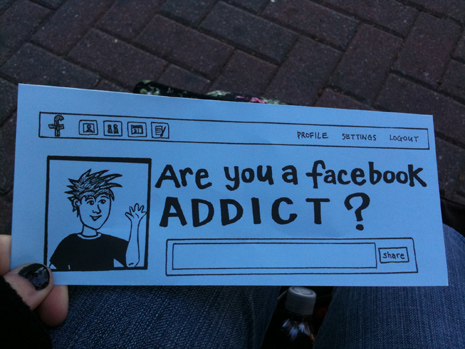Are you a Facebook addict?

This seems like a reasonable question. The amount of time that people spend on Facebook certainly seems to lead to the possibility that there is real potential that people could become "addicted" to social networking. Nonetheless, my daughter was somewhat nonplussed when a stranger, her own age, accosted her on the streets of Manhattan and stuck a pamphlet in her face with that question as a headline.

Given the popularity of Facebook and its impact on society, I wasn't really surprised to see that someone was using "Facebook addiction" as a platform to push their specific agenda. Much like Greenpeace taking Facebook to task, using Facebook to raise the profile of your own group or cause is like any other political action that grabs the coattails of pop culture to raise its own profile.
My daughter watched the person who had given her the pamphlet and realized that they were targeting people in her age group (college age), with careful attention to those holding phones in their hands. Obviously, this represents quite a few people at a train station in mid-town NYC. She also realized that there was more than one person handing out these pamphlets and that they were engaging some people in very animated conversation.
This actually prompted her to open the pamphlet, expecting to find a "put down the phone and pay attention to the world" message, much like her Dad (me) has given her on more than one occasion. What she wasn't expecting to find was a multipage diatribe about the fact that privacy was no longer possible for the Facebook addict, and that the solution was to pick up the bible and friend Jesus.
Yes, this wasn't merely a random handout, but religious propaganda aimed directly at teenagers and young adults who are active Facebook users. Of course, it also wasn't a message from a mainstream religious group but the one that goes by the oxymoron of Jews for Jesus.
Now beyond the distaste my daughter and I share for that particular cult, this branch of Christianity has traditionally used pamphlets and college aged acolytes to distribute their message, and, somewhat ironically, have a large presence on Facebook. And they are entitled to do so. Despite the fact that I find their methods and message deceptive, they aren't committing any crimes.
But this entire affair brought something to mind very clearly. As an involved parent, I've always kept an eye on my children's online activities. I've worked with parents groups and talked about how to protect their children when browsing the web. And I realized that in more than a decade of casual involvement with this sort of thing, not once has a parent asked me how to prevent proselytizing towards their children.
Perhaps, as a Jew, I'm more sensitive to this that a Christian might be, but regardless, it would seem that this is an area which parents should pay more attention to, especially with the way that far too many children do social networking and accept friend requests from friends of friends and many other forms of casual connections.
This isn't the obvious type of thing that I usually see, such as pornography producers friending people in hopes of getting website hits, but a far more insidious danger. I've always had frank and open discussions with my children about my religious beliefs (their mother is not Jewish) and have always encouraged them to make up their own minds. And they have come to me when they have had questions.
But I'm now beginning to wonder exactly what kind of messages can easily be passed to children via social networking sites, and exactly how a responsible parent can provide a balance between allowing their children to be part of the world while providing the protection and information a good parent should, especially from unexpected directions such as this.